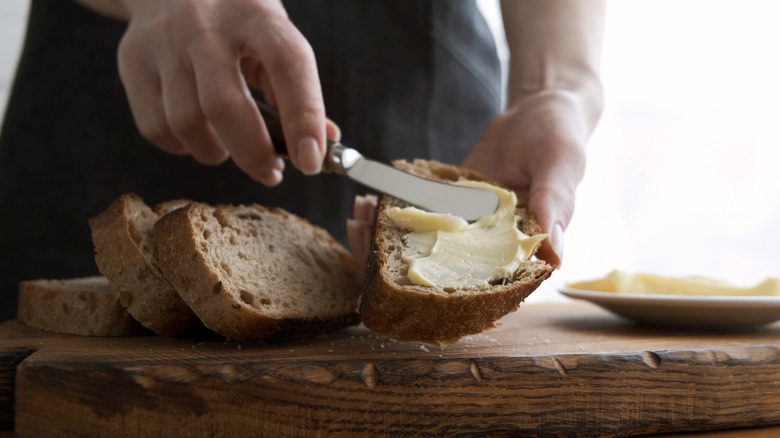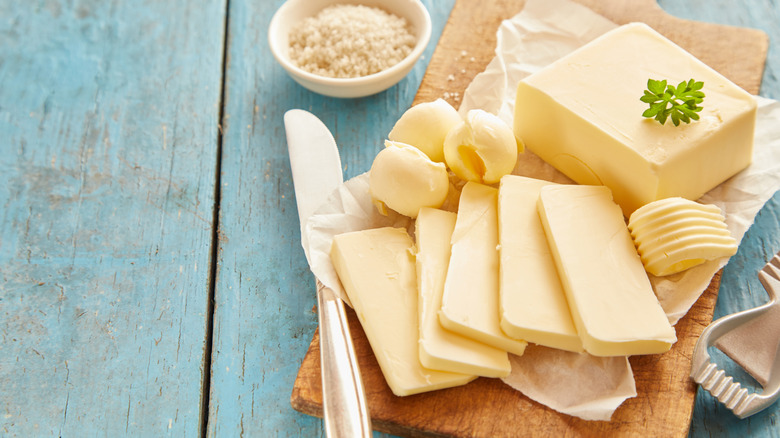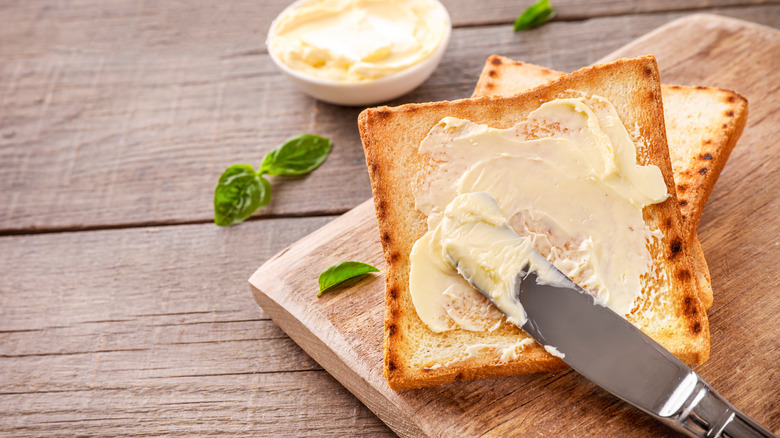The Big Difference Between Artificial Butter And Regular Butter
Most of us know that incorporating quality sources of fat into our diet is important. But what determines whether a fat is healthy or not? Medical News Daily suggests we try to maintain a balanced diet that includes both monounsaturated and polyunsaturated fats. Ideally, we'd eat more avocados, olive oil, nuts, seeds, and fatty fish while reducing our intake of saturated and trans fats often found in processed foods.
This guidance seems simple, but in modern-day living, it's hard to avoid processed foods altogether — especially with the rise of food science. Food science has taken us far in terms of offering alternate versions of common food staples (via ShareCare). For example, bread no longer has to contain gluten, candy no longer has to contain sugar, and butter no longer has to contain dairy. It's somewhat of a double-edged sword for consumers. Most of us enjoy having more options, but we often find ourselves overwhelmed and perplexed by the endless alternatives. Since butter is an all-time favorite ingredient for most, let's dive into the delicious food staple and the alternatives that exist on the market today.
Butter or margarine: The ultimate food fight
In 2020, the U.S. produced 2.15 billion pounds of butter (via Statista). This may not sound surprising considering we've found ways to put butter in almost everything, including our coffee. Regardless of how ubiquitous butter seems, it's had to share the market with margarine for more than 150 years (via USA Today).
So what's the difference? Well, butter is essentially just milk in solid form. Therefore, anyone with salt, cream, and ice can churn their own butter at home. On the other hand, according to Britannica, margarine is made from a variety of vegetable fats including cottonseed, soybean, peanut, coconut, and corn oils. But it's not just what's in butter and margarine that makes them different — it's also how they're produced.
Margarine undergoes hydrogenation, or hardening, of the fats in order to make them more shelf-stable and cheaper to produce (via Healthline). Vegetable spreads are generally deemed unhealthy and highly processed due to both the quality of ingredients and the manufacturing process (via The Wall Street Journal). Many spreads have historically contained high levels of artificial trans fats, touted as being the most dangerous kind of fat for our health. The Mayo Clinic reports that these trans fats raise levels of bad cholesterol and increase our risk of heart disease. Butter may be the more natural, wholesome choice between the two, but the margarine industry isn't backing down. Many brands are finding ways to omit artificial trans fats, as they were banned by the FDA in 2015.
What about plant-based butters?
Margarine isn't butter's only artificial competition — and it's not even the only plant-based butter alternative on the market. Margarine faces fierce competition thanks to the plant-based and vegan movements, including popular brands like Miyokos and Kite Hill. Knowing whether or not these alternatives are worth the often heftier price tag depends on why you're making the swap.
If you're looking for lactose-free, animal-free, and trans-fat free products, plant-based alternatives may be the best fit. Miyokos even claims their products bake, brown, melt, and spread like butter. Additionally, their ingredient list is comprised of ingredients such as nut milk, sunflower oil, sunflower lecithin, and sea salt. Per tablespoon, it has 90 calories, 8 grams of saturated fat, and 0 grams of trans fat. Comparatively, 1 tablespoon of butter has 102 calories and 11.5 grams of fat, according to Healthline. It also has 0.3 grams of trans fat (via WebMD).
Yes, butter does contain trace amounts of trans fats. However, some research suggests that naturally occurring trans fats, like those found in butter and red meat, aren't nearly as dangerous as artificial trans fats (via WebMD). If neither butter or their alternatives seem like great options for you, consider swapping in extra virgin olive and coconut oils which are typically less processed, and can be used for cooking and baking as well.



